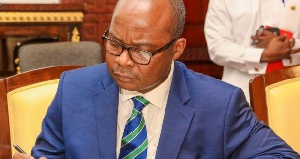Dr Ernest Kwamina Yehu Addison, the Governor of the Bank of Ghana (BoG), has urged banks to take advantage of the new policy framework of the Government to drive investment and achieve the growth agenda.
He explained that the agenda of the Government was to sustain the macro-economic environment through debt sustainability, drive the inflation rate to a single digit by the end of the year and fiscal consolidation and debt profiling.
It would also improve the business environment through tax incentives.
“Government also wants to increase investment in infrastructure and leverage on the oil and gas resources to create a robust job creation manufacturing sector,” he said.
He, therefore, entreated commercial banks to strengthen their financial capacity with the minimum capitalisation requirement of GHc60 million with the new banks having a start-up capital base of GHc120 million in order to support government’s investment drive.
Dr Addison said this at the second day of the Ghana Economic Forum (GEF) in Accra, on Tuesday, which is being organised by the Business and Financial Times Newspaper.
The two-day event is on the theme: “Building a Ghanaian Owned Economy, 60 Years After Independence,” which brought together more than 500 economic and business gurus, policy-makers, policy think tanks and entrepreneurs to brainstorm on how the Ghanaian business community could take advantage of the macro-economic stability to make gains.
Dr Addison, making a presentation on the topic: “Building Stronger Banks for a Stronger Economy”, noted that the Government’s new policies were geared towards stabilising the macro-economic environment.
This would ensure that the private sector could participate in the Government’s growth agenda for an accelerated national development.
“We know the macro-economic projections for this year…we’re looking at seven per cent growth rate in the medium term, single digit inflation, budget deficit of three per cent and enforcement of the fiscal responsibility law and having foreign exchange reserves of at least covering three months of import cover.
“We have no doubt that returning the economy to a higher growth, it requires that we have a stronger balance, support higher transactions in the economy and strong investment flow that would support our revenue growth,” he noted.
“We’re expecting oil production around 123,000 barrels per day, and already the first half of the year, we’re experiencing growth rate of 6.3 per cent which shows that the real economy is picking up.”
The Governor entreated banks to address the causes of the high non-performing loans because that was the only way they could guarantee additional capital, which would lead to additional lending.
“Otherwise, if converting those new capitals into non-performing loans then banks would not achieve any meaningful gains,” he said.
He said there was the need for banks to strengthen their capacity to absorb losses given the kind of transactions in the economy.
“There is the need for capitalisation of the banks due to the high levels of macro-economic instability which is at the root of the erosion of the capital base of the banks.
“We cannot afford a cycle of high inflation, high exchange rate, depreciation of the local currency, recapitalisation of the banks which is not sustained, and then you get to another vicious cycle of macro-economic instability which leads to further future recapitalisation.”
Dr Addison said any future decision for capitalisation of banks would be accompanied by procedures for enforcement.
To build a resilient banking sector to support growth, he said, the importance of the macro-economic stability and strong regulatory framework cannot be over-emphasised.
He said the government’s economic strategy implemented from the beginning of the year had yielded positive results with the reduction in the inflation rate, exchange rate, increased in the international gross reserves among other positive gains that would make the country an attractive destination for investment.
He said the formalisation of the economy with key architectural infrastructure like the interoperability of the payment system that would ensure financial inclusion, the digitalisation of the public addressing system and the national identification system would set the stage for economic prosperity.
Some issues discussed at the forum included agriculture, energy, insurance, entrepreneurship and innovation and how the Ghanaian businesses could take advantage of the stable macro-economic stability to make gains.
Business News of Tuesday, 8 August 2017
Source: GNA

















